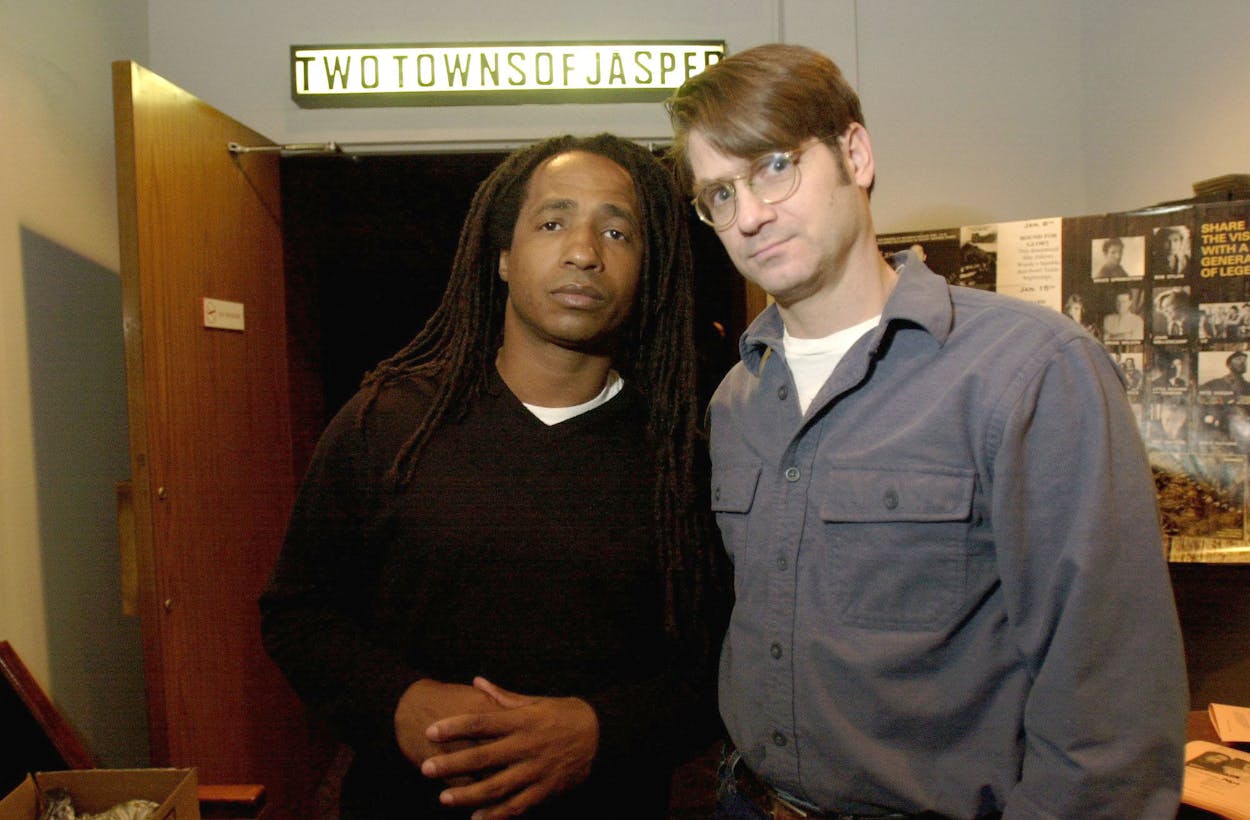Whitney Dow’s first deep dive into race and Texas happened over a decade ago. In 2002 Dow collaborated with Marco Williams to direct a documentary about one of Texas’s darkest moments and the town where it happened. The project, Two Towns of Jasper, placed Dow (a white man) and Williams (a black man) in Jasper for a year as the duo interviewed residents. Dow took an all-white crew to interview white residents, and Williams took an all-black crew to interview black residents. Raw honesty ensues.
Dow’s latest enterprise in race, journalism, and documentaries is the Whiteness Project, which is described as “an interactive investigation into how Americans who identify as white, or partially white, understand and experience their race.” Dow sits Americans down and films frank discussions on race in the U.S., and each video clip is followed by a statistic that ties into what’s discussed. The first installment took place in Buffalo, New York. The second installment, “Intersection of I,” is a bit more specific. The project, which released this month, features 23 millennials in Dallas.
The millennials seem to have a much firmer grasp on race, gender, and identity than upstate New Yorkers, which is probably a byproduct of younger Americans typically being more accepting and the fact that the conversation revolving around race is becoming more and more of a focal point (the project was filmed in July 2015). What’s particularly interesting in the contrast between these two installments is that there is a lot more discussion about identity in terms of sexuality and gender than in the previous one. Each of the interviews are engaging, but here are some choice quotes:
“Like my parents, for example, I feel like in their mind, they believe that whiteness is supreme over any other race and I’ve always just kind of gone along with that idea. For the longest time I didn’t want to be Mexican, I just wanted people to assume I was white. I didn’t wanna be associated with being Mexican, I thought it was a bad thing, but now I’m coming to realize, I like the Mexican side of myself.” — Javier, 20
“I don’t feel responsible for racism, but I feel like as a white person, it’s almost a duty of mine to try and end it.” — Casey, 18
“If we want to get rid of racism, stop talking about racism. Just stop. It’s really not that hard.” — Leilani, 17
“I don’t see color. I mean I do whenever you have to describe somebody or if you ask about their specific culture or ethnicity, but I just don’t see differences like that really.” — Makenna, 21
“I wouldn’t say that we owe other races reparations for the past because I’m not that person. I didn’t do that to you… I didn’t do anything to you guys, so step off [laughs]. You can’t get things for people who are dead. It’s all in the past, you have to build forward and just try to keep going. Do good for your own race.” — Chaney, 18
“I have friends who are of different ethnic origins than I am and we hang out one on one a lot and we have a great time. But when it comes time for them to go hang out with their bigger group of friends, who look like them and are a lot like them, there’s this kind of unspoken rule that I can’t be around that. There’s so much privilege I have, but there’s so much I can’t experience because there are doors open, but there are also doors closed to me, because of my skin color.” — Ella, 17
“In America now, being a white Christian is the hardest thing and that’s exactly what I am, I’m a white Christian male… I don’t hate black people, but some things about them irritate me, as a whole.” — Nathan, 17
“My mom is white and my father is Arab-American, and so I kind of got brought up with both, but I look more American. Mostly people associate me with being white. In Astoria no one knew until they started seeing my dad around and I would tell my dad ‘don’t come to my basketball games, don’t come to my volleyball games.” I didn’t want people to [see him] because he looks very Middle Eastern. So when people saw him and they found out, you know, I got called “terrorist daughter” and they were very rude to me.” — Lena, 21
“There’s been plenty of times where I have consciously taken advantage of the fact that I was white and always kind of knew that if I got in trouble that I could just get a lawyer, suit up, show up and it was a slap on the wrist. I would be in jail if I wasn’t white. I’ve been arrested probably over twenty times. The only thing I have on my record to show for it is a public intoxication. There have been some hefty drug possession charges and I’ve never served time. I sold drugs. I basically did whatever I wanted to do knowing that there was going to be absolutely no consequences.” — Connor, 24
“There was an incident about a year ago where my sister started dating a black guy and my dad did not approve and I heard him say the words: I do not want mixed grandchildren.” — Audrey, 18






